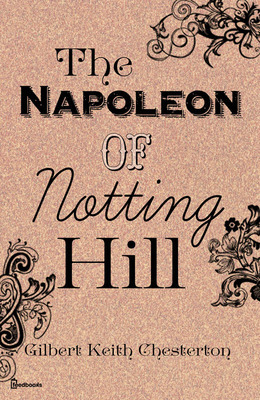‘Napoleon Of Notting Hill’ Unusual Speculative Fiction
In a drear future – or, we may say, a drear past that never was – democracy in England died. England sank into a dull despotism. Its army and police almost vanished; its King was chosen out of alphabetical lists. “No one cared how: no one cared who. He was merely a universal secretary.”
In a system like this, anybody could become King. And anybody did.
Auberon Quin was a man who cared for only one thing: a joke. As a private citizen, he made a fool of himself for his own amusement. As a king, he still made a fool of himself, but he quickly branched out to making fools of other people, too. He instituted the Charter of the Cities, making each municipality of London a sovereign city and imposing on them an absurd glory. Each city had its own guard, its assigned colors and heraldry. Each had a Lord High Provost, who could not put a letter in a mail-box without five heralds proclaiming the fact with trumpets.
For ten years, the businessmen and bureaucrats endured the robes and trumpets and heralds. Then the farce was interrupted by a lunatic, who mistook the whole thing for a drama and wanted to turn it into an epic.
The Napoleon of Notting Hill was written by G. K. Chesterton and published in 1904. After a satiric prologue about the game Cheat the Prophet, the narrator sets the story “eighty years after the present date.” This adds up to 1984, and the colorless, moribund England of Notting Hill, languishing in a world made ever more uniform by imperialism, would have been dystopia to Chesterton. So this is another English novel presenting a dystopian 1984, but of quite another flavor.
Like all Chesterton novels, Notting Hill is written in omniscient style; the narrator is practically a character, and that character is G. K. Chesterton. A brief sample: “In the beginning of the twentieth century you could not see the ground for clever men. They were so common that a stupid man was quite exceptional, and when they found him, they followed him in crowds down the street and treasured him up and gave him some high post in the State.”
In humor, social criticism, spiritual opinions, and the well-used paradox, whole passages of Chesterton’s fiction are indistinguishable from his nonfiction. There’s a rambling quality to Notting Hill sometimes, and the long paragraphs of dialogue often serve Chesterton’s ideas more than his plot. Still, this book stands out as one of the most disciplined of Chesterton’s novels.
As obvious as Chesterton was in expressing his opinions through the pages of his novels, he also managed one of the most subtle interweaving of theme and plot that I have ever seen. The main theme of The Napoleon of Notting Hill is patriotism, but it takes until the very end of the book to see how the plot cross-examines the idea of loving your country. Notting Hill becomes a nation in microcosm, passing through in twenty years what takes real nations centuries, and new turns in the story present new arguments against patriotism. The slaughter at the end of the novel, uncharacteristic and startling, offers the most final argument.
Although a dystopian of a sort, and set far in the future of its writing, Notting Hill is an unusual specimen of speculative fiction. Neither technology nor magic has any real place in its world, which is the London of 1904 draped with medieval glory. The English government is altered in a few, somewhat metaphysical paragraphs in order to make the creation of Notting Hill possible. But there’s no menace to it, just plenty of room for absurdity. Big Brother is not listening.
Still, Notting Hill shares one great commonality with many better-known works of speculative fiction: It explores the present through the future. The glory of speculative fictio n is that it is, more than other popular genres, about ideas, and Notting Hill is about nothing if not an idea.
n is that it is, more than other popular genres, about ideas, and Notting Hill is about nothing if not an idea.
The Napoleon of Notting Hill overflows with humor and depth. The characters are large as life and enjoyable, though they seem sometimes to be embodiments of different philosophies as much as people. The plot is very good – quick, unexpected, lively. “Two Voices” – the novel’s closing chapter, and its climax – is a masterpiece, the full meaning of the story bursting forth in an evocative and fascinating scene. And Chesterton not only considers the worth and meaning of patriotism, but gives voice to its heart, ringing in the words of Adam Wayne: “I have a city. Let it stand or fall.”







































And doubtlessly Very British
Chesterton was British, so no doubt his book is very British. Is that something we must now campaign against?
Do I have to start quoting Monty Python at you to convince you of my appreciation for Very Britishisms? “I’m being repressed!”
Or I should I make a joke about engaging in unAmerican activities by being pro-British?
I read THE NAPOLEON OF NOTTING HILL a number of years ago, but couldn’t have told you one thing about the characters or the plot — this makes me think I ought to try it again. My favorite Chesterton novel is still THE MAN WHO WAS THURSDAY, which I have read multiple times and which, I think, holds up much better as an Actual Story than NoNH does.